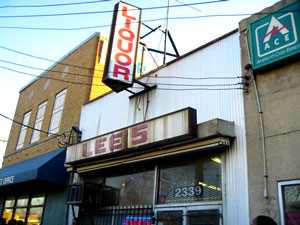
WASHINGTON (FinalCall.com) – Ward 8 in the nation’s capital could be any urban section of any city. It has the requisite projects, poor schools, crime, check cashing stores, liquor stores, carry outs and convenience stores. It also has drug paraphernalia that can be bought just about anywhere, even on the ice cream trucks.
For 10 years, the community has tried to get rid of drug paraphernalia by appealing to the moral sensibilities of the owners of the stores in the community–which has not worked. So now, they’re hitting them where it hurts: by challenging the stores’ liquor licenses.
“Ten years ago, I met with 50 business owners about their sale of drug paraphernalia, but couldn’t get community support behind me. People were just so used to it,” said Phil Panell, executive director of the Anacostia Coordinating Council.
The Anacostia Coordinating Council has filed 18 challenges with the Alcohol and Beverage Control (ABC) board for Class D stores that primarily sell beer and wine.
“Today, the community sees more and more how drugs are ravaging our community,” he told The Final Call. “They’re a big factor in the youth violence we see. Now more people are willing to be involved even though there still are only a handful of folks involved.”
That handful includes Anthony Muhammad, chair of the Ward 8A Advisory Neighborhood Commission. He met Mr. Panell at a hearing to challenge a store’s liquor license.
“I didn’t like seeing liquor stores on every corner. All we did was just complain about it, but nothing was being done. I was concerned that their stores and advertisements were close to schools. That meant drunks were hanging around where children had to walk to school,” he shared with The Final Call. “Not only were they loitering, they were leaving trash and the stores were filthy. They have fire code, health and permit violations. Just because we’re Black and mostly poor doesn’t mean we have to live in or near filth.”
After that meeting, Mr. Panell and Mr. Muhammad joined forces to rid their community of drug paraphernalia and liquor stores too close to schools.
“The ABC board promises to work with you and assist. They encourage you to meet with the owners and discuss the problems. They want you to try and work out the problems. If that doesn’t happen, then the ABC board will step in,” Mr. Muhammad explained.
“Most of the time, it doesn’t work out to the community’s advantage. A liquor license costs about $100,000. The city doesn’t want to lose that revenue,” he pointed out.
One concern is the sale of ‘tobacco-smoking implements’ or what is commonly known as rolling papers. They are used legally for rolling tobacco into cigarettes. Their illegal purpose is for smoking marijuana and other drugs. Add to that, the sale of cigars such as Philly Blunts, Dutch Masters, and Backwoods, from which the tobacco can be removed, and then replaced with marijuana.
“Who are these stores catering to?” asked Mr. Panell. “They sell rolling papers, but they don’t sell loose tobacco. Why is it Black kids have to face rolling papers and blunts when they’re ordering fried chicken and mumbo sauce at the local carry out?”
He insists that the wrong message is being sent to our children and community.
“We’ve grown numb because it’s so commonplace. At the local gas station, you can get practically anything you need to do illegal drugs,” he argued.
Not at the Fort Dupont BP Amoco.
It may be the only gas station in that part of the city that doesn’t sell drug paraphernalia.
“I don’t sell drug paraphernalia,” owner James Jackson told The Final Call. “It’s my choice and it’s the neighborhood’s choice. I’ve never sold it.”
In D.C., like other states, the sale of drug paraphernalia is illegal. However, the gray area is determining what exactly is drug paraphernalia.
“With all of these things, it’s a matter of proof,” Benjamin Friedman, chief of the Misdemeanor Trial Section of the U.S. Attorney’s Office, told the Washington City newspaper. “If there is an innocent use, a common innocent use, it can be more difficult to prosecute. It’s ultimately about whether you can convince a judge that an item is for drug use and only drug use or, if it has an alternative legitimate use, that it is rarely used for that.”












